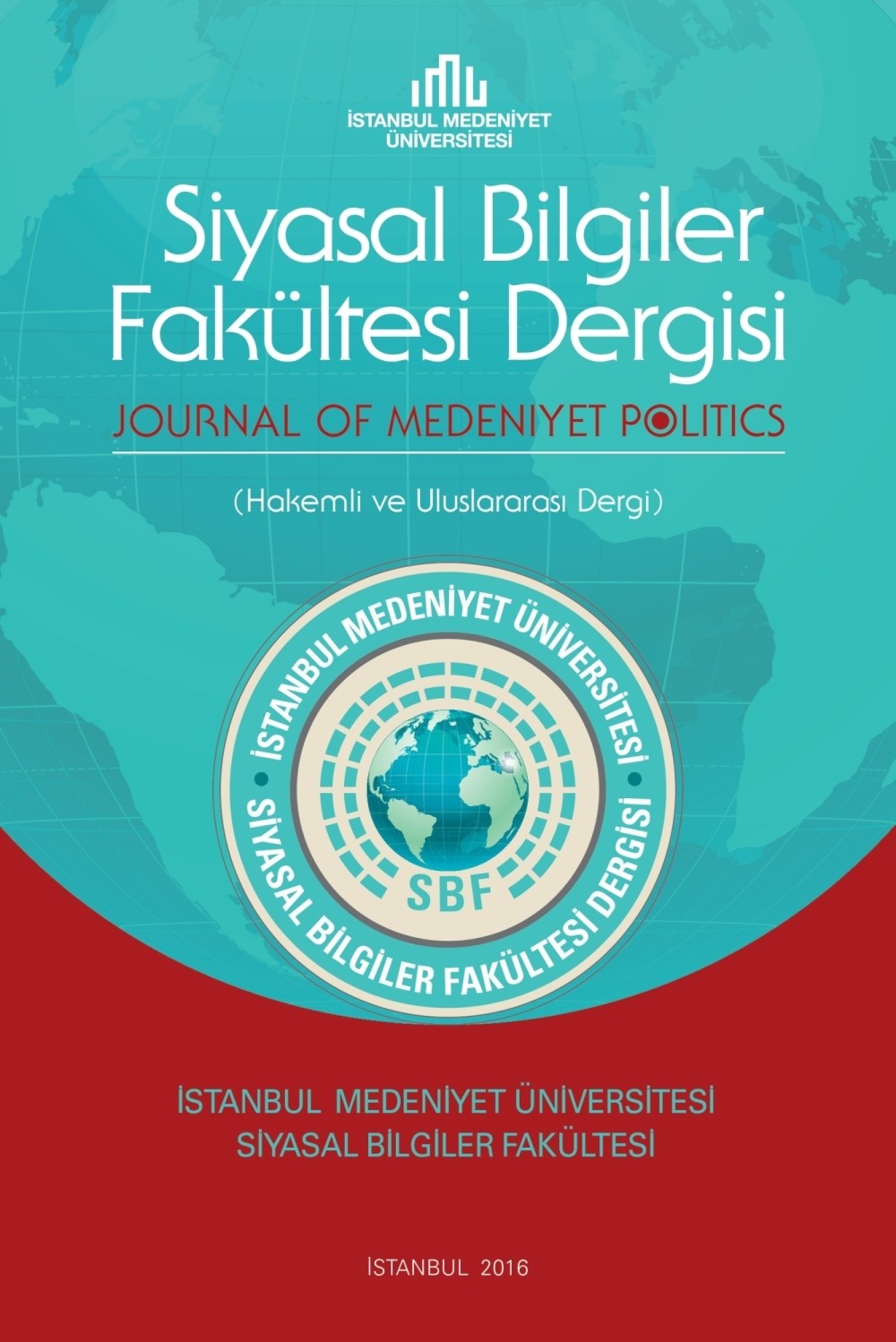Sanayi 4.0’ın Merkezsizliği: Uluslararası İlişkiler Teorilerinde Devletin Rolü Tartışmalarının Sonu mu?
Bu makalede 21. Yüzyılın birinci çeyreği bitmeye yaklaşırken en çok tartışılan konulardan
biri olan dördüncü sanayi devriminin (Sanayi 4.0) uluslararası ilişkiler teorilerinde devletin
rolü tartışmalarına muhtemel etkileri irdelenmiştir. Sanayi 4.0’ın otomasyon teknolojilerindeki
odağının işsizlik oranını artırması veyahut iyi ihtimalle emek kavramının içeriğini
değiştirerek nitelikli iş gücüne olan ihtiyacı artıracağı düşünülmektedir. Bununla beraber,
her iki senaryo altında da işsizlik rakamlarının artacağı genel bir kabuldür. Bu minvalde,
işsizliğin oluşturacağı sosyal denge bozulmalarının devletlerin toplumsal hayattaki rolleri
üzerindeki etkilerinin uluslararası ilişkiler teorilerine de yansıması kaçınılmazdır. Bu makale,
Sanayi 4.0-işsizlik-sosyal dengeler-devlet-teori ilişkisini irdelemekte ve bir senaryo
analizi yapmaktadır. Analizin sonucunda ise, işsizliğin veya emek niteliğinin değişiminde
devletin rolünü azaltacağı değil, aksine artıracağını öngörmekte ve uluslararası ilişkiler teorilerindeki
devletin rolü tartışmalarının daha da süreceğini savunmaktadır.
Anahtar Kelimeler:
Sanayi 4.0, İşsizlik, Uluslararası İlişkiler Teorileri, Devlet, Huntington
Decentralization in Industry 4.0: The End of the Debates in International Relations Theories on the Role of the State?
This article discusses the impact of the fourth industrial development (Industry 4.0) on the
great debate in international relations discipline about the role of state in international relations
theories. Industry 4.0, through automation mechanisms, is expected to increase the
need for qualified labor by leading the increase in the unemployment rate in the world, or
at best, by changing the content of the concept of labor. By the way, in all cases, the increase
in unemployment rate is the common acceptance in discussions. In this respect, this article
agrees with the inevitability of reflections on the debates in international relations theories
of social disruptions due to increased unemployment. This article explores the relations between
industry 4.0, unemployment, social disruptions, the state and international relations
theories and makes a scenario analysis. In conclusion, it claims the increase of the role of
the state, rather than a decrease, due to the unemployment or change in the qualification
of labor, and therefore probably, the continuity of the debates over the role of the state in
international relations theories.
Keywords:
Industry 4.0, Unemployment, International Relations Theories, State, Huntington,
___
- Al-Rodhan, N. R. F. (2011). The Politics of Emerging Strategic Technologies: Implications for Geopolitics, Human Enhancement and Human Destiny. Springer.
- Aribogan, D. Ü. (2018). Duvar: Tarih Geri Dönüyor.
- Arıboğan, D. Ü. (2007). Uluslararası ilişkiler düşüncesi: Tarihsel gelişim.
- Beard, C. A. (1927). Time, technology, and the creative spirit in political science. American Political Science Review, 21(1), 1–11. https://doi.org/10.2307/1945535
- Campbell-Verduyn, M., Rodima-Taylor, D., & Hütten, M. (2020). Technology, small states and the legitimacy of digital development: Combatting de-risking through blockchainbased re-risking? Journal of International Relations and Development, 24(2), 455–482. https://doi.org/10.1057/s41268-020-00198-5
- Elliott, A. (2004). Social theory since Freud: Traversing social ımaginaries. Routledge.
- Ersoy, E. (2014). Realizm. In Uluslararası ilişkiler teorileri. İletişim Yayınları.
- Guitton, M. J. (2022). Sovereignty in the age of technology: Challenges and Opportunities. Computers in Human Behavior, 134, 107331. https://doi.org/10.1016/j.chb.2022.107331
- Huntington, S. P. (2006). Political order in changing societies. Yale University Press.
- Jones, S. (2011). Is Human Evolution Over? In Evolution 2.0: Implications of Darwinism in Philosophy and the Social and Natural Sciences (pp. 167–176). Springer Science & Business Media.
- Keller, J. W. (2014). Misusing virtual worlds can be dangerous: A response to Carvalho. International Studies Perspectives, 15(4), 558–563. https://doi.org/10.1111/insp.12087
- Krugman, P. (2009). A country is not a company. Harvard Business Review Press.
- Kutlay, M., & Karaoğuz, H. E. (2017). Neo-developmentalist turn in the global political economy? The Turkish case. Turkish Studies, 19(2), 289–316. https://doi.org/10.1080/14683849.2017.1405727
- Li, S., Wang, D., Dong, H., & Fu, Q. (2022). Blockchain development and corporate performance in China: The role of ownership. Emerging Markets Finance and Trade, 1–13. https://doi.org/10.1080/1540496x.2022.2026770
- Lobell, S. E., Ripsman, N. M., & Taliaferro, J. W. (2009). Neoclassical Realism, the State and Foreign Policy. In Neoclassical Realism, the State, and Foreign Policy. Cambridge University Press.
- Machová, R., Korcsmáros, E., Šeben, Z., Fehér, L., & Tóth, Z. (2021). Developing the competences of generation Z with ınnovative teaching methods in the context of the requirement of labour market by ındustry 4.0. International Journal of Advanced Corporate Learning (IJAC), 14(2), 17–26. https://doi.org/10.3991/ijac.v14i2.24993
- Malthus, T. R. (1966). First essay on population 1798. Palgrave Macmillan (UK).
- Marchant, G. E., & Wallach, W. (2020). Emerging technologies: Ethics, law and governance. Routledge.
- Mudde, C. (2004). The populist zeitgeist. Government and Opposition, 39(4), 541–563. https://doi.org/10.1111/j.1477-7053.2004.00135.x
- Myeong, S., & Jung, Y. (2019). Administrative reforms in the fourth ındustrial revolution: The case of blockchain use. Sustainability, 11(14), 3971. https://doi.org/10.3390/su11143971
- Nitze, P. (1959). Necessary and sufficient elements of a general theory of international relations. In Theoretical aspects of international relations (pp. 1–15). University of Notre Dame Press.
- Ranson, B. (1986). Planning education for economic progress: Distinguishing occupational demands from technological possibilities. Journal of Economic Issues, 20(4), 1053–1065. https://doi.org/10.1080/00213624.1986.11504575
- Schwab, K. (2016). Dördüncü Sanayi Devrimi. Optimist Yayın Grubu.
- Ünay, S. (2017). Global Political Economy After the Crisis: Theoretical Perspectives and Country Experiences. Nova Science Publishers.
- Yergin, D. (2011). The quest: Energy, security, and the remaking of the modern world. Penguin.
- Başlangıç: 2016
- Yayıncı: İstanbul Medeniyet Üniversitesi
Sayıdaki Diğer Makaleler
